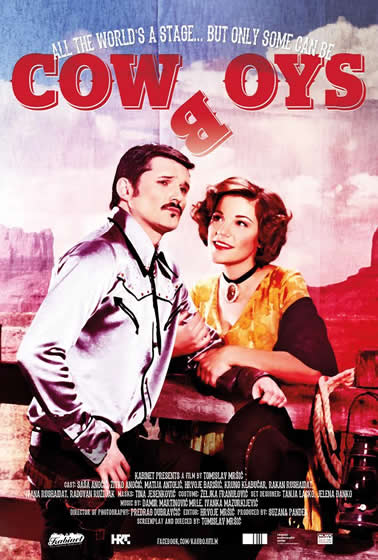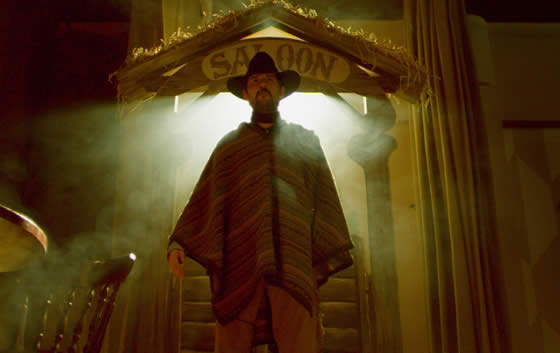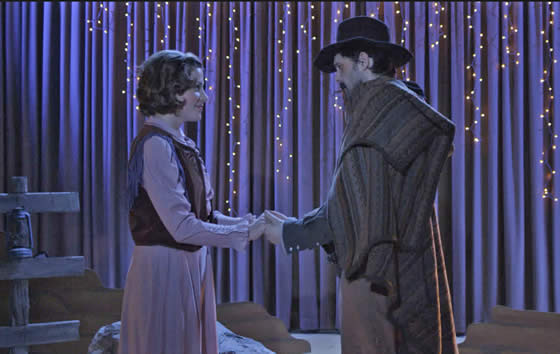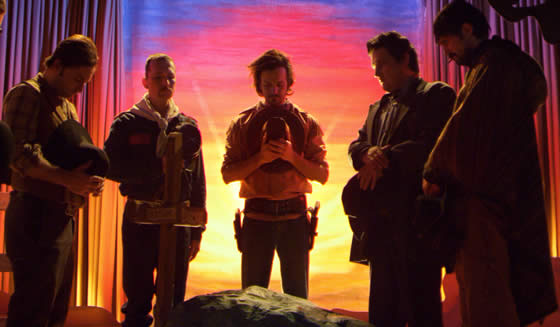 COWBOYS is a gloriously dark comedy about a group of outcasts who come together to put on a play and, in the process, change the course of their lives. Based on a popular, award-winning Croatian play, Cowboys is part social drama, part farce. An award-winning box office hit, COWBOYS is the official entry from Croatia for foreign language at the 87th Academy Awards.
COWBOYS is a gloriously dark comedy about a group of outcasts who come together to put on a play and, in the process, change the course of their lives. Based on a popular, award-winning Croatian play, Cowboys is part social drama, part farce. An award-winning box office hit, COWBOYS is the official entry from Croatia for foreign language at the 87th Academy Awards.
Sasha, a successful theatre director, has been offered the opportunity to re-start a neglected local theater in his home town, which is a challenge as the city has no actors. When the theater schedules auditions for a new show, only inexperienced candidates show up.
The director and his new ensemble of misfits decide to base their play on classic Hollywood Westerns, their only common ground. As the actors embrace the stereotypes of the genre – the fight between good and evil, the clash between civilization and the wilderness – they develop their stories. Breaking every rule of stagecraft, as time passes they start to view the play as a metaphor for their own destinies, and grasp it as the opportunity of a lifetime.
Based on a popular, award-winning Croatian play, Cowboys is part social drama, part farce, and all wacky, with a denouement that will have everyone cheering in the aisles.
Tomislav Mrsic was born in Zagreb in 1972. He became involved in film while studying at the Faculty of Political Sciences, University of Zagreb, which he graduated from in 1998. He is the author of numerous documentaries and television shows. His documentary films won several awards and acclaims, which include Film Critics Award Oktavijan for the best documentary films in 2002 and 2008 (Rio Bravar and Slucajni sin). He also received the best debutant award at the Days of Croatian Film Festival in 2002 for his film Sala nije na liniji 310. His documentaries were screened at all major film festivals in the region. Along with documentaries, he directs short feature films and promotional videos, and also assists directors on television series and feature films. He directs Posebni dodaci (Bonus Tacks), a TV show about film on Croatian National Television. He is one of the founding members of MUF, Film Art Museum association.
Cinema Without Borders: How did you come up with the idea of making COWBOYS?
Tomislav Mrsic: As it happens with ideas, they come along when you least expect them. It was like that in this case because I really had no idea I would find an idea for a film in theater. Originally, Cowboys is a stage piece, a combination of comedy and musical. That’s definitely not my favorite combination but when a rumor spread about the play I went to see it. So there I am, going to the theater with some skepticism, even frightened by the idea of having to spend three and a half hours watching it. However, after only a few scenes, I realized it was not a mistake. By the first intermission (it has two parts) I was convinced it was an excellent material for a feature film.
CWB: Can you tell us about the preparation stage in this project?
TM: Sometimes I joke about it and I say the preparations took me 39 years (that was my age when we started working on the film), so it would be really unprofessional from me not to have prepared well. Fortunately, before Cowboys, I worked on many feature films as an assistant director so I was pretty much aware of what was I embarking on. While working on other people’s films I learnt, first of all, that preparation is half of the job, so we prepared quite well. In the scriptwriting phase, I would give the finished parts to the people I trust to check them out and I tried to adopt their advice and comments. When the script was finally completed, I discussed it with my director of photography and we drew it take by take, scene by scene. Those were probably not perfect works of art but they helped us collaborate on the set perfectly and without too many words. After that we sat down with heads of all sections and drew it all again, this time with floor plans and camera positions, and we planned it all very accurately. This is why I would come to the set more relaxed than when I was an assistant director. Paradoxical though it may be, I think it is particularly important in the films that allow actors’ improvisation – and Cowboys has plenty of it.
CWB: How challenging was the making of this film? TM: You mean, besides the fact that it was my first film? Making a film is always a challenge, but making your first film is a particular challenge.
TM: You mean, besides the fact that it was my first film? Making a film is always a challenge, but making your first film is a particular challenge.
CWB: Please tell us about your casting process for COWBOYS.
TM: The answer to this question is closely linked to the first question. Most of the actors I took from the play because it was the actors who thrilled me the most, thus provoking me to start thinking about the film. What thrilled me particularly was the fact that they were all young, new actors, most of whom had no experience on film yet. Quite the opposite, some of them had never acted before the play and were actually hired as singers or musicians. The fact that they were rather anonymous mattered a lot to me because I think it contribute to their authenticity. They are much more convincing as outsiders.
CWB: Did you do a lot of rehearsals or did you just work with actors and crew on the set?
TM: I have to admit we had lots of rehearsals before the shooting. While the fact that the actors had known each other and the text very well from the theatrical performance was a great asset, the play was at the same time a setback in a way, because not one scene that we took from the play remained the same. Some scenes were blended into one scene, some ended up much shorter, some were extended – so we had to deal with potential confusion that could arise from it. Indeed, the first few rehearsals were truly funny because one actor would say a line from the script and the other would reply with a line from the play. But everything soon fell into place so that later, on the set, we almost didn’t rehearse at all. We would try some variations only now and then.
CWB: Did you allow any improvisations proposed by your cast or crew?
TM: The answer to this question is directly linked with the last one. When I mentioned the variations, I actually meant improvisation. I like when actors occasionally improvise – it’s like the cherry on the cake. But one should take care and avoid too many cherries that could spoil the taste. Although it may sound paradoxical, this is why I think that sound preparations, solid script and absolute teamwork are particularly important in the films that allow actors to improvise. There were no other improvisations than the ones by the actors.
CWB: How did you come up with the visual style of your film?
TM: On the one hand, Cowboys takes place in a post-socialist backwater place in a small country – Croatia, in this case. On the other hand, it is a tribute of a sort to western movies which were probably the first contact with the West and Western culture for us grownups. The style and dramaturgy of the film is based on these premises. They are trying to combine the harshness of a backwater town and the universal poetics of the Western iconography.
CWB: How much of film found its final form in the editing process?
TM: I have to admit that not much footage was discarded, maybe one or two completed scenes. Of course, a few of the scenes that we kept had been shortened. One of the reasons may be the fact that it was my producer’s and my first film and we couldn’t afford a lengthy shooting.
CWB: Please tell us about the critics’ and audiences’ reactions to COWBOYS.
TM: I think the critics’ and audiences’ reactions were equally good. It was one of the three top-grossing films of the year in Croatia and reviews were almost unanimous in their acclaim). What makes me particularly happy is the fact that the film received rave notices even outside Croatia and Croatian language – contrary to the assurances that comedies have problem crossing borders.
CWB: Any future projects that you can tell us about?
TM: There are ideas, of course, some way back from my childhood. For some of them I have already received initial funds for script development from Croatian Film Fund, but these projects are still in their infancy so I can’t tell you more about them.
